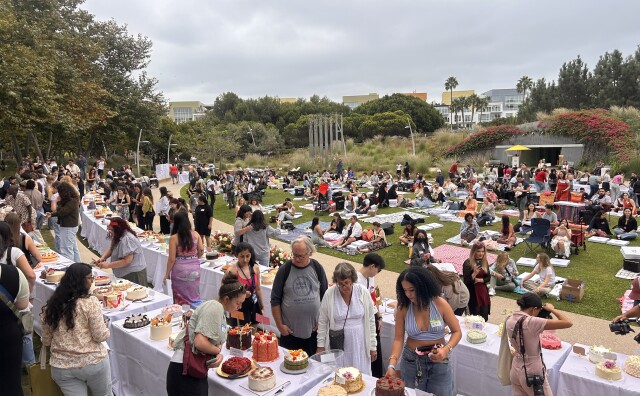Congress has cut federal funding for public media — a $3.4 million loss for LAist. We count on readers like you to protect our nonprofit newsroom. Become a monthly member and sustain local journalism.
This archival content was written, edited, and published prior to LAist's acquisition by its current owner, Southern California Public Radio ("SCPR"). Content, such as language choice and subject matter, in archival articles therefore may not align with SCPR's current editorial standards. To learn more about those standards and why we make this distinction, please click here.
Los Angeles Is 87 Percent Urban, According To Angelenos
A recent survey shows that Los Angeles may be, despite its reputation, surprisingly urban—at least in terms of how the people who live here describe it. Those of us who call downtown or Koreatown home may have already felt like we live in a very urban area, but for many—mostly outsiders—Los Angeles conjures an image of sprawl. The U.S. Census basically clumps urban and suburban together—regardless of whether someone lives in a huge mixed-user next to a subway station with ground floor retail, or in a single-family home in a subdivision. Jed Kolko, chief economist at Trulia, decided to try to find a better way to more clearly define urban and suburban areas, according to FiveThirtyEight.
Kolko and Trulia surveyed 2,008 people across the country. Each was asked to describe whether their neighborhood was urban, rural or suburban. They did not give residents any kind of description of what these terms meant, and used the residents' ZIP codes as their neighborhoods. Based on these responses, they then mapped out the areas. Los Angeles came out as 87 percent urban. You can compare that to NYC and Chicago—both 100 percent urban—or San Diego (49 percent) or Phoenix (30 percent).
Granted, a person's perception of where they live isn't always a great indicator of what that place is, and the distinction between urban and suburban largely varies based on a person's lived experiences. A New Yorker and someone from a smaller Midwestern city might feel very different about what constitutes as a city, or what seems bustling or sprawling.
It seems as though people in this particular survey were inclined to say they lived in an urban neighborhood if they lived in a dense area, or one with over 2,213 households per square mile. If residents lived in areas with 102 households or fewer per square mile, they often described their neighborhood as rural. If that number was somewhere in between, respondents were likely to define their home as suburban. The survey also found that people were more inclined to say they lived in urban areas if they were near other dense ZIP codes, lived in low-income areas or lived near a lot of businesses.
[h/t Curbed LA]
As Editor-in-Chief of our newsroom, I’m extremely proud of the work our top-notch journalists are doing here at LAist. We’re doing more hard-hitting watchdog journalism than ever before — powerful reporting on the economy, elections, climate and the homelessness crisis that is making a difference in your lives. At the same time, it’s never been more difficult to maintain a paywall-free, independent news source that informs, inspires, and engages everyone.
Simply put, we cannot do this essential work without your help. Federal funding for public media has been clawed back by Congress and that means LAist has lost $3.4 million in federal funding over the next two years. So we’re asking for your help. LAist has been there for you and we’re asking you to be here for us.
We rely on donations from readers like you to stay independent, which keeps our nonprofit newsroom strong and accountable to you.
No matter where you stand on the political spectrum, press freedom is at the core of keeping our nation free and fair. And as the landscape of free press changes, LAist will remain a voice you know and trust, but the amount of reader support we receive will help determine how strong of a newsroom we are going forward to cover the important news from our community.
Please take action today to support your trusted source for local news with a donation that makes sense for your budget.
Thank you for your generous support and believing in independent news.

-
According to a grand jury report the contractor took advantage of strained relations and political pressures to “force” the city to pay hundreds of millions of dollars to settle disputes.
-
Administrators say the bargaining units should be dismissed, or that they have no standing. One campus is going after the federal agency in charge of union activity.
-
The landslide is not connected to the greater Portuguese Bend landslide, city officials said.
-
Nom. Nom. Nom. The event destroyed the internet when it was first announced — and sold out in minutes.
-
The critical findings are part of long-awaited after-action report was released Thursday. It contains recommendations for increasing emergency staffing and updating old systems.
-
Diving has changed, mountain biking has been added. Here's where to watch the Olympics in person in 2028.







